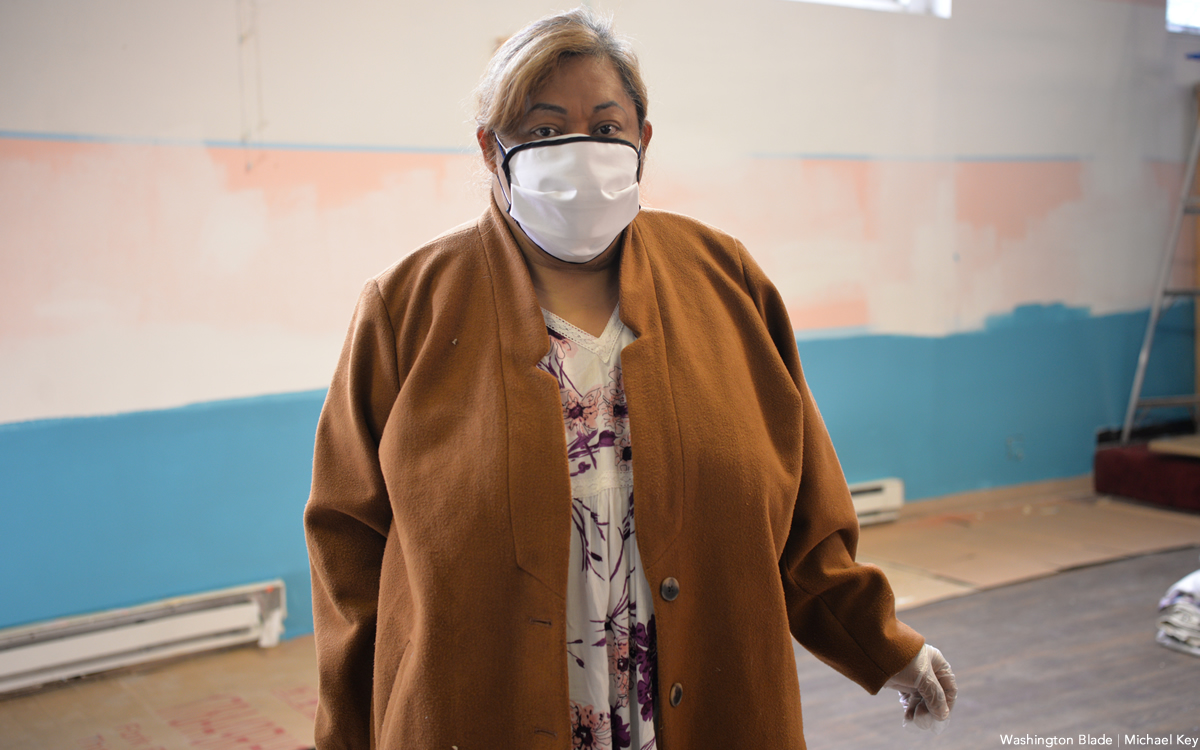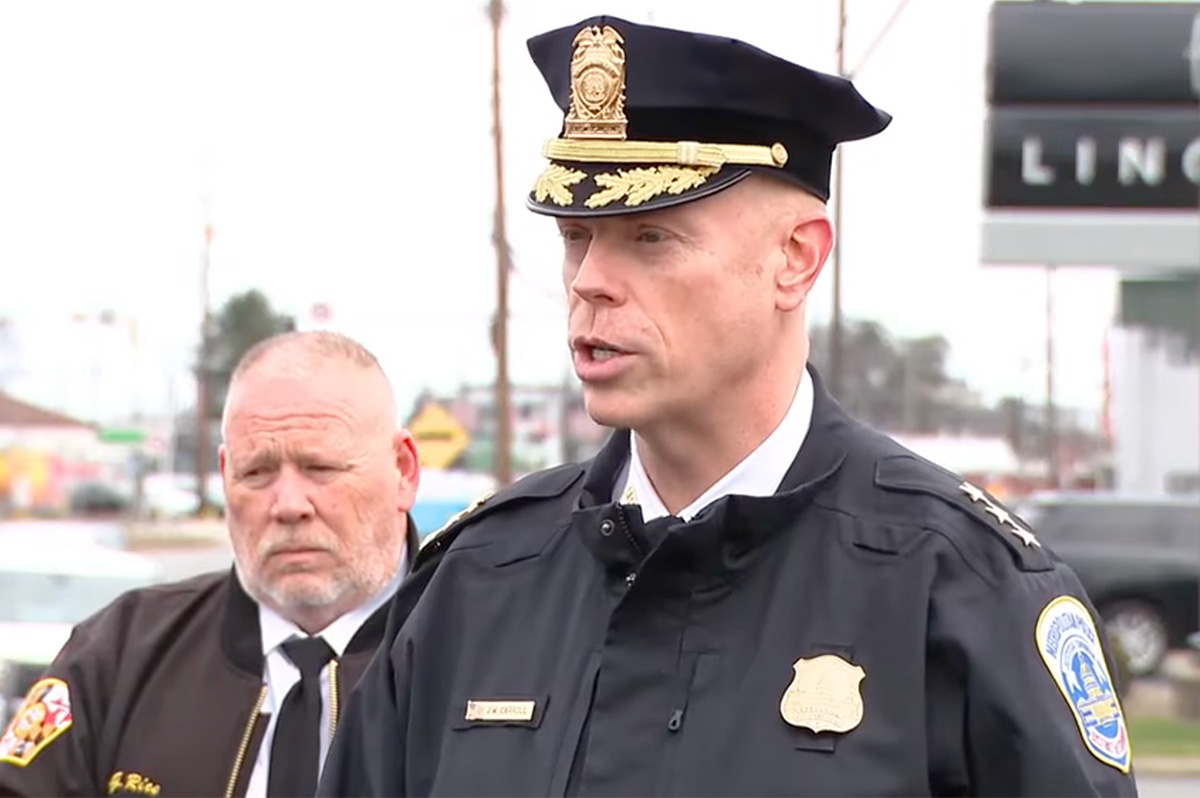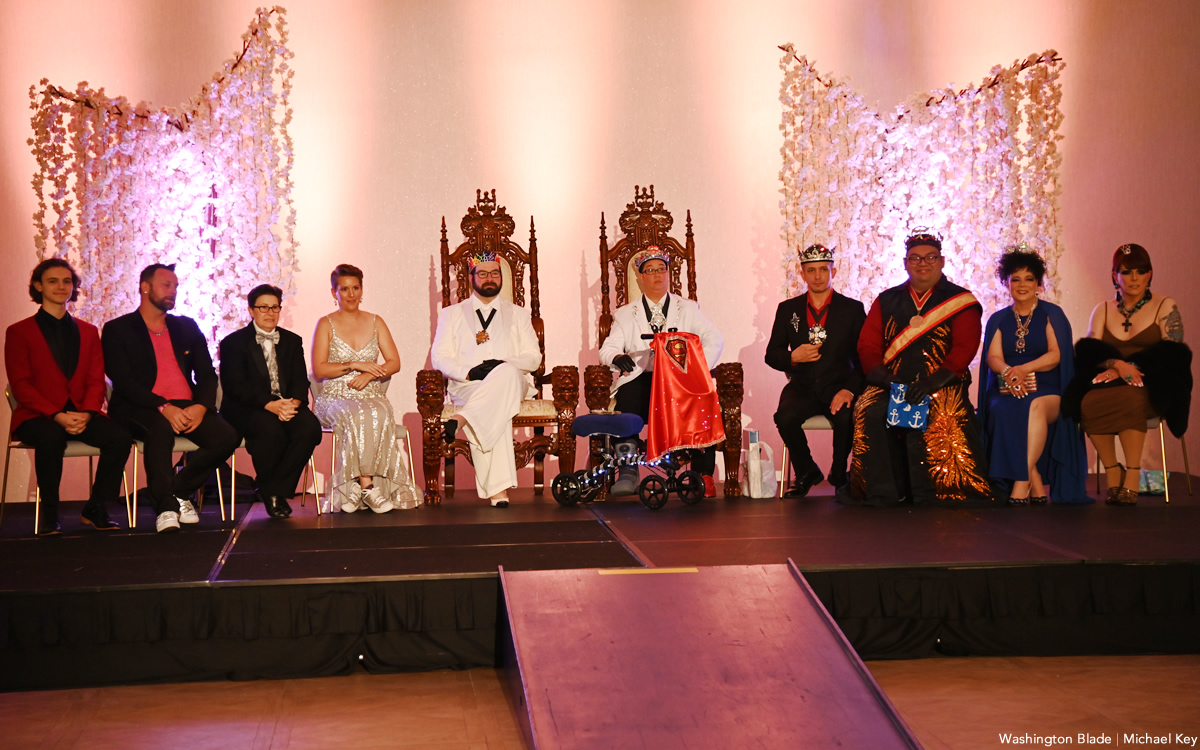District of Columbia
Ruby Corado withdrew $400,000 of Casa Ruby funds: D.C. att’y gen’l
Complaint says she transferred money to banks in El Salvador

The Office of the D.C. Attorney General on Monday filed an amended civil complaint in D.C. Superior Court against Casa Ruby and its founder and former executive director Ruby Corado that includes new allegations, including claims that Corado withdrew more than $400,000 of Casa Ruby funds for unauthorized use in El Salvador.
The 25-page amended complaint adds multiple new allegations to the Attorney General office’s original complaint against Casa Ruby filed on July 29. That complaint, among other things, charged the nonprofit LGBTQ community services organization and Corado with violating the D.C. Nonprofit Corporations Act in connection with its financial dealings.
The amended complaint also follows the approval by D.C. Superior Court Judge Danya Dayson of a request in August by the Attorney General’s office to place Casa Ruby under receivership and to appoint the Wanda Alston Foundation as the receiver. The D.C.-based Alston Foundation provides housing services for homeless LGBTQ youth.
On Oct. 28, the Alston Foundation released its Receiver’s Second Interim Report on its findings related to Casa Ruby’s finances. The report points to some of the same unexplained and unauthorized expenditures and transfers of Casa Ruby’s funds by Corado that are included in the AG office’s amended complaint.
The Alston Foundation had been scheduled to release its Receiver’s Third Interim Report also on Monday, Nov. 28. But Alston Foundation Executive Director June Crenshaw told the Washington Blade the foundation requested an extension of that deadline to give it a chance to review the new allegations in the AG office’s amended complaint.
Among other things, the AG office’s amended complaint adds three new defendants to what legal observers say is the equivalent of a lawsuit by the D.C. government against Corado and Casa Ruby. The new defendants named in the complaint are limited liability companies created and controlled by Corado to purportedly perform services in support of Casa Ruby.
They include a new version of Casa Ruby called Casa Ruby LLC doing business as Moxie Health; Pneuma Behavioral Health LLC; and Tigloballogistics LLC doing business as Casa Ruby Pharmacy.
The amended complaint notes that Corado, who claimed the new companies, especially the pharmacy, were part of Casa Ruby’s mission, never received approval to create the companies from the Casa Ruby board of directors, which the AG’s office has said rarely met and failed to provide any oversight of Corado’s actions.
According to the amended complaint, Corado transferred large sums of money from the original Casa Ruby to these companies and at some point, transferred funds from the new companies to her own personal bank account.
Both the earlier complaint filed in July and the amended complaint allege that Corado transferred as much as $500,000 of Casa Ruby’s funds to create what she said was a new Casa Ruby in El Salvador approved by the Casa Ruby board. But the earlier and amended complaints allege that the board never authorized the El Salvador operation.
Between April 2021 and September 2022, the amended complaint says, Corado transferred over $400,000 from two Casa Ruby related accounts “to accounts she held under her birth name in two El Salvador banks.” It says the Casa Ruby board “never authorized any of these transfers.”
In addition to the financial related allegations, the amended complaint charges Casa Ruby and Corado with violating D.C.’s Wage Payment and Collection Law and the D.C. Minimum Wage Revision Act by failing to pay Casa Ruby employees all the wages they earned for their work several months before Casa Ruby closed its operations in July 2022.
“At various times between July 2021 and July 2022, while Corado was freely supplementing her $260,000 salary with additional funds drawn from Casa Ruby’s bank accounts, many of Casa Ruby’s employees were paid only $15.00 per hour, less than the minimum wage in the District of Columbia as of July 1, 2021,” the amended complaint says. “None of these employees received the full wages they earned,” it says.
One of the former employees told the Washington Blade most of the remaining employees during Casa Ruby’s final months before its shutdown were paid late or not paid at all. Under the two labor related laws the amended complaint has charged Casa Ruby and Corado with violating, an employer could be required to pay the employees any lost or missing wages.
But the Receiver’s Second Interim Report filed in October by the Alston Foundation says among other improper financial dealings, Casa Ruby failed to pay the U.S. Internal Revenue Service payroll taxes withheld from its employees. The AG office’s amended complaint says that as of June of this year, Casa Ruby owed the IRS $127,435 in employment taxes, not including interest and penalties.
The receiver’s report points out that under federal law, employers that owe back taxes to the IRS must pay those claims first. “Thus, after all outstanding payroll taxes have been paid off, there is little chance that there will be anything left for any other debts or obligations like past rent or wages,” the report says.
The amended complaint filed by the AG’s office says a copy of the amended complaint was sent to Corado through an email address, which has been the only known way of reaching Corado. Former Casa Ruby employees have said she had been spending most of her time over the past year or longer in El Salvador. The complaint says that as of October, Corado still had not retained an attorney to represent her and was representing herself in a process known as pro se representation.
The Blade couldn’t immediately reach Corado for comment on the amended complaint through the same email address.
During a virtual court hearing in September, Corado denied any improper or illegal financial practices and blamed the D.C. government for Casa Ruby’s collapse, saying city agencies cut off funding for Casa Ruby without a legitimate reason. However, the D.C. Department of Human Services, which provided much of Casa Ruby’s funding through grants, has said the funding was stopped after Casa Ruby failed to submit financial reports required for all grant recipients that account for how the grant money is spent.
District of Columbia
Kennedy Center renaming triggers backlash
Artists who cancel shows threatened; calls for funding boycott grow

Efforts to rename the Kennedy Center to add President Trump’s name to the D.C. arts institution continue to spark backlash.
A new petition from Qommittee , a national network of drag artists and allies led by survivors of hate crimes, calls on Kennedy Center donors to suspend funding to the center until “artistic independence is restored, and to redirect support to banned or censored artists.”
“While Trump won’t back down, the donors who contribute nearly $100 million annually to the Kennedy Center can afford to take a stand,” the petition reads. “Money talks. When donors fund censorship, they don’t just harm one institution – they tell marginalized communities their stories don’t deserve to be told.”
The petition can be found here.
Meanwhile, a decision by several prominent musicians and jazz performers to cancel their shows at the recently renamed Trump-Kennedy Center in D.C. planned for Christmas Eve and New Year’s Eve has drawn the ire of the Center’s president, Richard Grenell.
Grenell, a gay supporter of President Donald Trump who served as U.S. ambassador to Germany during Trump’s first term as president, was named Kennedy Center president last year by its board of directors that had been appointed by Trump.
Last month the board voted to change the official name of the center from the John F. Kennedy Memorial Center For The Performing Arts to the Donald J. Trump And The John F. Kennedy Memorial Center For The Performing Arts. The revised name has been installed on the outside wall of the center’s building but is not official because any name change would require congressional action.
According to a report by the New York Times, Grenell informed jazz musician Chuck Redd, who cancelled a 2025 Christmas Eve concert that he has hosted at the Kennedy Center for nearly 20 years in response to the name change, that Grenell planned to arrange for the center to file a lawsuit against him for the cancellation.
“Your decision to withdraw at the last moment — explicitly in response to the Center’s recent renaming, which honors President Trump’s extraordinary efforts to save this national treasure — is classic intolerance and very costly to a non-profit arts institution,” the Times quoted Grenell as saying in a letter to Redd.
“This is your official notice that we will seek $1 million in damages from you for this political stunt,” the Times quoted Grenell’s letter as saying.
A spokesperson for the Trump-Kennedy Center did not immediately respond to an inquiry from the Washington Blade asking if the center still planned to file that lawsuit and whether it planned to file suits against some of the other musicians who recently cancelled their performances following the name change.
In a follow-up story published on Dec. 29, the New York Times reported that a prominent jazz ensemble and a New York dance company had canceled performances scheduled to take place on New Year’s Eve at the Kennedy Center.
The Times reported the jazz ensemble called The Cookers did not give a reason for the cancellation in a statement it released, but its drummer, Billy Hart, told the Times the center’s name change “evidently” played a role in the decision to cancel the performance.
Grenell released a statement on Dec. 29 calling these and other performers who cancelled their shows “far left political activists” who he said had been booked by the Kennedy Center’s previous leadership.
“Boycotting the arts to show you support the arts is a form of derangement syndrome,” the Times quoted him as saying in his statement.
District of Columbia
New interim D.C. police chief played lead role in security for WorldPride
Capital Pride says Jeffery Carroll had ‘good working relationship’ with organizers

Jeffery Carroll, who was named by D.C. Mayor Muriel Bowser on Dec. 17 as the city’s Interim Chief of Police, played a lead role in working with local LGBTQ community leaders in addressing public safety issues related to WorldPride 2025, which took place in D.C. last May and June
“We had a good working relationship with him, and he did his job in relation to how best the events would go around safety and security,” said Ryan Bos, executive director of Capital Pride Alliance.
Bos said Carroll has met with Capital Pride officials in past years to address security issues related to the city’s annual Capital Pride parade and festival and has been supportive of those events.
At the time Bowser named him Interim Chief, Carroll had been serving since 2023 as Executive Assistant Chief of Specialized Operations, overseeing the day-to-day operation of four of the department’s bureaus. He first joined the D.C. Metropolitan Police Department in 2002 and advanced to multiple leadership positions across various divisions and bureaus, according to a statement released by the mayor’s office.
“I know Chief Carroll is the right person to build on the momentum of the past two years so that we can continue driving down crime across the city,” Bowser said in a statement released on the day she announced his appointment as Interim Chief.
“He has led through some of our city’s most significant public safety challenges of the past decade, he is familiar with D.C. residents and well respected and trusted by members of the Metropolitan Police Department as well as our federal and regional public safety partners,” Bowser said.
“We have the best police department in the nation, and I am confident that Chief Carroll will meet this moment for the department and the city,” Bowser added.
But Bowser has so far declined to say if she plans to nominate Carroll to become the permanent police chief, which requires the approval of the D.C. City Council. Bowser, who announced she is not running for re-election, will remain in office as mayor until January 2027.
Carroll is replacing outgoing Chief Pamela Smith, who announced she was resigning after two years of service as chief to spend more time with her family. She has been credited with overseeing the department at a time when violent crime and homicides declined to an eight-year low.
She has also expressed support for the LGBTQ community and joined LGBTQ officers in marching in the WorldPride parade last year.
But Smith has also come under criticism by members of Congress, who have accused the department of manipulating crime data allegedly showing lower reported crime numbers than actually occurred. The allegations came from the Republican-controlled U.S. House Oversight Committee and the U.S. Justice Department
Bowser has questioned the accuracy of the allegations and said she has asked the city’s Inspector General to look into the allegations.
Meanwhile, a spokesperson for the D.C. police Office of Public Affairs did not immediately respond to a question from the Washington Blade about the status of the department’s LGBT Liaison Unit. Sources familiar with the department have said a decline in the number of officers currently working at the department, said to be at a 50-year low, has resulted in a decline in the number of officers assigned to all of the liaison units, including the LGBT unit.
Among other things, the LGBT Liaison Unit has played a role in helping to investigate hate crimes targeting the LGBTQ community. As of early Wednesday an MPD spokesperson did not respond to a question by the Blade asking how many officers are currently assigned to the LGBT Liaison Unit.
District of Columbia
Imperial Court of Washington drag group has ‘dissolved’
Board president cites declining support since pandemic

The Imperial Court of Washington, a D.C.-based organization of drag performers that has raised at least $250,000 or more for local LGBTQ and non-LGBTQ charitable groups since its founding in 2010, announced on Jan. 5 that it has ended its operations by dissolving its corporate status.
In a Jan. 5 statement posted on Facebook, Robert Amos, president of the group’s board of directors, said the board voted that day to formally dissolve the organization in accordance with its bylaws.
“This decision was made after careful consideration and was based on several factors, including ongoing challenges in adhering to the bylaws, maintaining compliance with 501(c)(3) requirements, continued lack of member interest and attendance, and a lack of community involvement and support as well,” Amos said in his statement.
He told the Washington Blade in a Jan. 6 telephone interview that the group was no longer in compliance with its bylaws, which require at least six board members, when the number of board members declined to just four. He noted that the lack of compliance with its bylaws also violated the requirements of its IRS status as a nonprofit, tax-exempt 501(c) (3) organization.
According to Amos, the inability to recruit additional board members came at a time when the organization was continuing to encounter a sharp drop in support from the community since the start of the COVID pandemic around 2020 and 2021.
Amos and longtime Imperial Court of Washington member and organizer Richard Legg, who uses the drag name Destiny B. Childs, said in the years since its founding, the group’s drag show fundraising events have often been attended by 150 or more people. They said the events have been held in LGBTQ bars, including Freddie’s Beach Bar in Arlington, as well as in other venues such as theaters and ballrooms.
Among the organizations receiving financial support from Imperial Court of Washington have been SMYAL, PFLAG, Whitman-Walker Health’s Walk to End HIV, Capital Pride Alliance, the DC LGBT Community Center, and the LGBTQ Fallen Heroes Fund. Other groups receiving support included Pets with Disabilities, the Epilepsy Foundation of Washington, and Grandma’s House.
The Imperial Court of Washington’s website, which was still online as of Jan. 6, says the D.C. group has been a proud member of the International Court System, which was founded in San Francisco in 1965 as a drag performance organization that evolved into a charitable fundraising operation with dozens of affiliated “Imperial Court” groups like the one in D.C.
Amos, who uses the drag name Veronica Blake, said he has heard that Imperial Court groups in other cities including Richmond and New York City, have experienced similar drops in support and attendance in the past year or two. He said the D.C. group’s events in the latter part of 2025 attracted 12 or fewer people, a development that has prevented it from sustaining its operations financially.
He said the membership, which helped support it financially through membership dues, has declined in recent years from close to 100 to its current membership of 21.
“There’s a lot of good we have done for the groups we supported, for the charities, and the gay community here,” Amos said. “It is just sad that we’ve had to do this, mainly because of the lack of interest and everything going on in the world and the national scene.”
-

 National4 days ago
National4 days agoWhat to watch for in 2026: midterms, Supreme Court, and more
-

 Colombia5 days ago
Colombia5 days agoBlade travels to Colombia after U.S. forces seize Maduro in Venezuela
-

 Minnesota5 days ago
Minnesota5 days agoTim Walz drops out of Minn. governor’s race
-

 Virginia5 days ago
Virginia5 days agoLGBTQ groups to join Spanberger inaugural parade


















